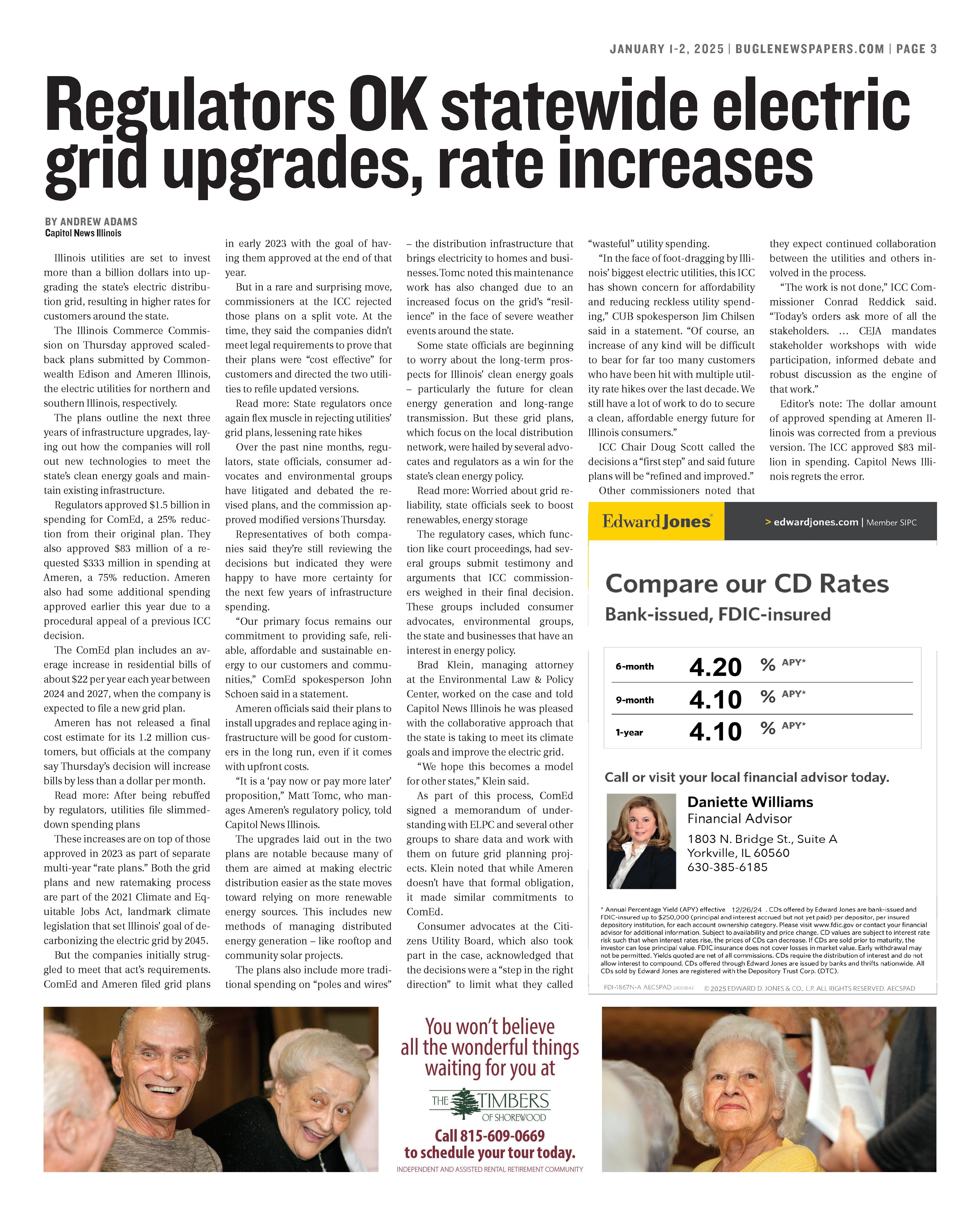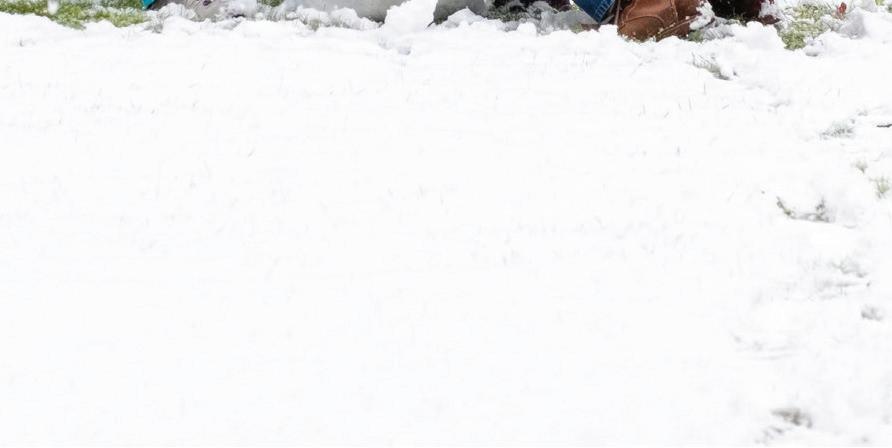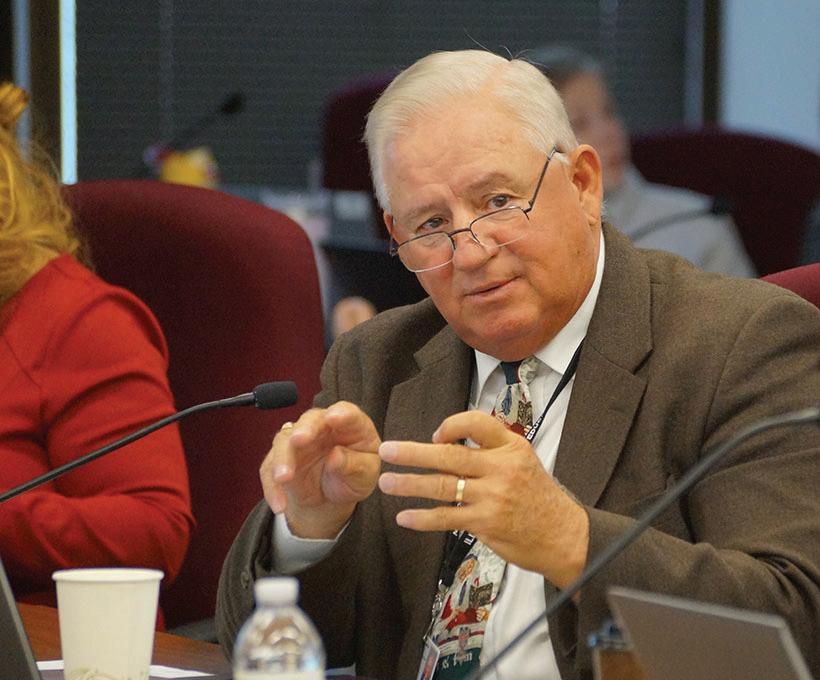By randy whalen For the Bugle


By randy whalen For the Bugle

By B en szalinski Capitol news illinois
Time to study up, Illinois. When the clock hits midnight on New Year’s Day, 293 new state laws will take effect.
Those include some of the defining bills of the 2024 legislative session and others that will change how people get IDs, evaluate job postings and even cancel gym memberships.
In addition to the laws taking effect on Jan. 1, the state’s minimum wage will rise to $15 to complete a ramp up initiated during Gov. JB Pritzker’s first month in office in 2019.
The secretary of state can begin creating a process to issue digital driver’s licenses and state IDs beginning in the new year after Pritzker signed House Bill 4592. Residents will still be required to receive a physical ID and agencies or private entities will not be required to accept digital IDs in place of physical IDs.
Providing a phone to police to show a digital ID also doesn’t give





police consent to search a person’s cell phone.
Salary transparency
Employers with 15 or more employees must include information about benefits and the salary range on job postings, according to House Bill 3129. The law will also apply to businesses hiring for remote work positions in Illinois.
“When employers aren’t transparent about pay, gender and racial wage gaps widen, costing women and people of color valuable compensation,” Lt. Gov. Juliana Stratton said in a news release. “Illinois’ new Pay Transparency law is a resounding win for the working people who call our state home.”
‘Junk’ health insurance
Short-term, limited duration health insurance plans will be illegal in Illinois beginning Jan. 1. The plans, often called “junk insurance” by critics, do not meet the minimum standards of the federal Affordable Care Act.
The ban outlined in House Bill 2499 was part of Pritzker’s health insurance overhaul that lawmakers passed in the spring. It was aimed at reducing barriers to care for patients and making health care more affordable by expanding coverage requirements for insurance companies.
Short-term insurance plans are typically for people who have a lapse in health insurance coverage such as when they lose or change jobs, but they are different from COBRA benefits, which most employers are required to offer under federal law. Supporters of the bill argued the plans are deceptive and stick consumers with huge out-of-pocket costs, but others said the plans provide consumers with an affordable option to fill a gap in coverage.
Caregiver discrimination
House Bill 2161 adds family responsibilities to the list of categories protected from discrimination and retaliation in the workplace. The new law prevents employers from taking adverse action against employees because of their responsibilities as a caregiver for a family member, which could cause them to miss work.
Bill sponsor Rep. Will Guzzardi, D-Chicago, told a House committee in April that pregnant women are a good example of who the bill is designed to help. He said pregnant women shouldn’t be passed up for a promotion or face other consequences at work in anticipation that they will be taking time off to care for their baby. Guzzardi stressed the bill does not protect employees who fail to meet job performance require-
Starts with UChicago Medicine
AdventHealth Medical Group
Plainfield Primary Care
Having a primary care provider is one of the best things you can do to protect your family’s health. This provider knows you and your medical history and can connect you to any health services you may need over time.
• Provides regular health screenings
• Helps keep you from getting sick
• Knows your medical history
• Ensures timely treatment for many conditions
• Manages your medications
• Helps you live a healthy lifestyle
• Serves as a trusted source for medical advice and care
Call 815-436-8831 to learn more or schedule an appointment today! UChicagoMedicineAdventHealth.org
ments.
New laws governing artificial intelligence take effect Jan. 1. It will be illegal to generate child pornography using AI, according to House Bill 4623. Supporters of the bill, including the Illinois Attorney General’s Office, said it is becoming more difficult to distinguish between real and AI-generated images. They said updating Illinois’ child pornography laws was a necessary to step allow law enforcement to identify and prosecute child pornography cases.
House bill 4875 also adds new protections to prohibit using AI to recreate a person’s voice, image or likeness for commercial purposes without the person’s consent. Recording artists can seek damages for violations of the law.
Politics and religion at work
Employees can’t be required to sit through work meetings discussing religion or politics starting Jan. 1.
Senate Bill 3649, an initiative of the Illinois AFL-CIO, creates new protections for employees who skip out on such meetings and prevents employers from retaliating against them.
The law does not prohibit discussing religion or politics at work, but employees are not required to participate in the discussions if such activities are not part of their job. The


Our office is conveniently located at 15728 S. Route 59 in Plainfield
We also offer ENT and Cardiology services with imaging and lab services on the same campus.
law excludes non-profit and advocacy groups where politics or religion may be part of job.
Coming later in 2025
Pritzker’s signature health reform package goes into effect on Jan. 1, but most provisions don’t have to be implemented until the beginning of 2026. House Bill 5395 bans “step therapy,” which requires patients to try and fail treatments preferred by insurance companies before they can receive the treatment recommended by their doctor.
It also bans insurance companies from requiring prior authorization for emergency in-patient mental health treatment, requires insurers to keep up-to-date lists of in-network providers and expands the power of the Illinois Department of Insurance to regulate premium rates.
Many hotels in Illinois will no longer be allowed to provide customers with single-use plastic soap and shampoo beginning July 1 under Senate Bill 2960. The move is designed to cut down on waste from single-use products. The Illinois Hotel & Lodging Association supported the change. Hotels with fewer than 50 rooms have until 2026 to make the change.
Other new laws
NIL money: Student athletes at NCAA universities can earn name,
image and likeness money directly from their universities. House Bill 307 was an initiative of the University of Illinois.
Hearing aids: Insurance providers must cover medically prescribed hearing aids for all people under House Bill 2443. Coverage was previously only required for those under 18.
Gym memberships: House Bill 4911 requires gyms and fitness centers to accept multiple ways for people to cancel their membership. Physical fitness locations also must now allow customers to cancel their membership by email or online. Customers will also be allowed to submit written notice for canceling their membership by mail.
Subscription renewals: Businesses that offer a free trial or promotional period for their product or service must notify customers at least three days before the subscription automatically renews at a paid rate under Senate Bill 2764. The law only applies to subscriptions longer than 15 days.
Crime victim DNA: DNA evidence collected from a person who is the victim of a crime to aid a criminal investigation cannot be entered into a DNA database, according to House Bill 1168.

By PR te R H a NC o CK Capitol news illinois
Public schools in Illinois have enjoyed several consecutive years of substantial increases in state funding, thanks largely to steady growth in state revenues and a new funding formula that lawmakers approved in 2018.
But whether that can continue into the upcoming fiscal year is an open question that state lawmakers will have to face when they return to the Statehouse in January.
With budget forecasters predicting flat revenue growth over the next year and continued demands for increased spending in other areas of the budget such as pension costs and health care, members of the Illinois State Board of Education were told Wednesday that they are now in a different fiscal environment.
“I do not envy anybody involved in that process because it won’t be a fun time,” Eric Noggle, revenue manager of the legislature’s Commission on Government Forecasting and Accountability, or COGFA, told the board.
COGFA is a nonpartisan agency that provides economic and budgetary analysis to the General Assembly. It operates independently of the Governor’s Office of Management and Budget, or GOMB, although the two agencies are often in agreement in their general findings and analysis.
In November, GOMB issued a report projecting a $3.2 billion deficit in the fiscal year that begins July 1, 2025. That was based on projections of essentially flat revenue growth of about $53.4 billion, and a 6% increase in spending due to statutorily required increases in things like pension contributions, Medicaid and state employee health care costs, and PreK-12 education.
In the current fiscal year, state spending on public schools totals just under $11 billion, or about 20% of the state’s $53 billion General Revenue Fund Budget.
Two factors are primarily responsible for the demand for increased state spending on schools. One is the 2018 funding formula, known as the Evidence-Based Funding model, that calls for annual increases of at least $350 million.
That law sets out a formula for determining what would be an “adequate” level of funding for each district based on factors such as

total student enrollment, poverty rates, and the number of English language learners in the district.
The adequacy target includes both state aid and money the district is able to raise on its own through local property taxes.
The law then directs that the new money each year be sent to districts that are furthest away from their adequacy target. The annual funding increases are supposed to continue until all districts reach at least 90% of their adequacy target.
But some advocates argue the state needs to increase its evidence-based funding by more than the minimum $350 million each year.
“One thing that we know is that three out of four children in Illinois are still in underfunded districts. That’s more than 1 million students,” Jelani Saadiq, director of government relations for the advocacy group Advance Illinois,
told the board during the public comment portion of its meeting Wednesday. “The latest school report card shows continued challenges with chronic absenteeism and lagging recovery in math. We need to set our schools up for success in addressing these challenges in the absence of federal stimulus funds by doubling down on our EBF investment moving forward.”
The other factor driving increases in public school spending is known as “mandatory categorical” spending, or MCAT, which includes such things as transportation costs, the state’s free breakfast and lunch program and the cost of educating children in foster care.
Andy Krupin, ISBE’s director of funding and disbursements, explained that the state often does not fully fund MCAT expenses and thus “prorates” the amount it reimburses districts for those expenses. The level of proration varies de-
pending on how much the General Assembly appropriates in each category.
Based on the agency’s estimate of next year’s costs, Krupin said, the General Assembly would need to add another $142.2 million to its PreK-12 budget just to maintain the same level of proration as this year.
Combined with the $350 million increase called for under the EBF formula, that would be a total increase in PreK-12 spending of $492.2 million next year.
But ISBE has received requests for even more funding increases than that. During a series of public hearings on the budget in October, officials said, the agency heard numerous proposals adding up to about $2.2 billion in funding increase requests. Those included proposals for a $550 million increase in EBF funding and a $10 million increase in career and technical education funding, among
other requests.
GOMB’s projection of a $3.2 billion deficit assumed a $444 million increase in school spending, as well as a $1.1 billion increase in health care expenses and a $437 million increase in pension contributions, among other increases.
State Superintendent of Education Tony Sanders is scheduled to submit his final budget proposal to the board for approval at the board’s Jan. 15 meeting. Pritzker is scheduled to deliver his budget address to the General Assembly Feb. 19.
Capitol News Illinois is a nonprofit, nonpartisan news service that distributes state government coverage to hundreds of news outlets statewide. It is funded primarily by the Illinois Press Foundation and the Robert R. McCormick Foundation.


